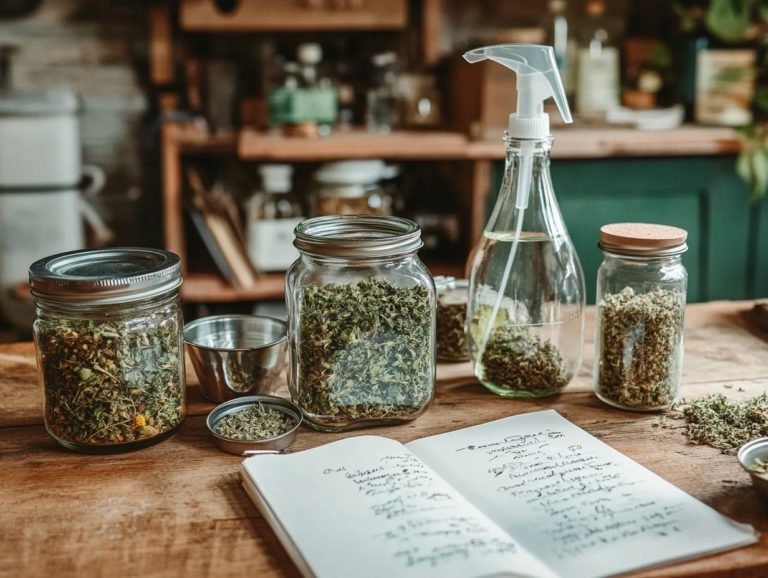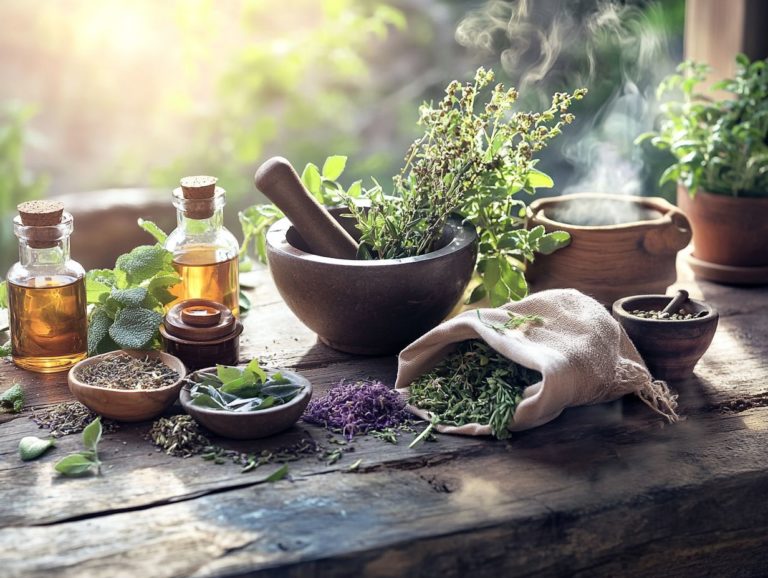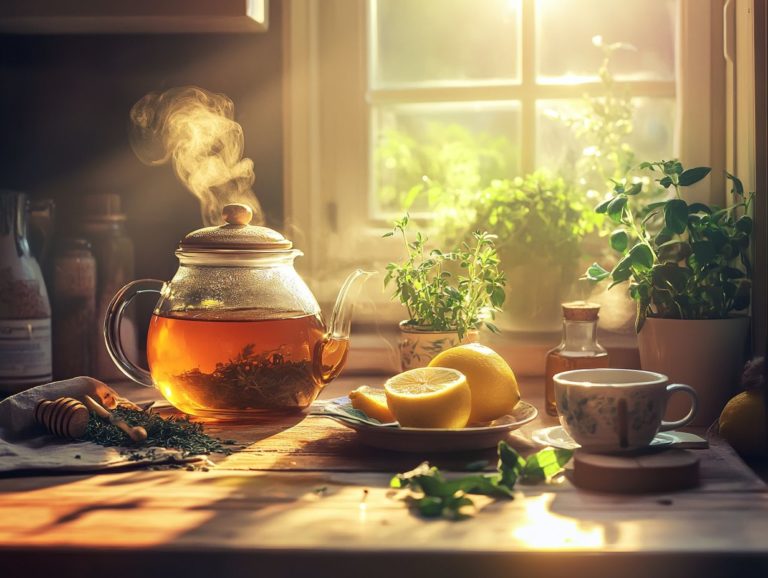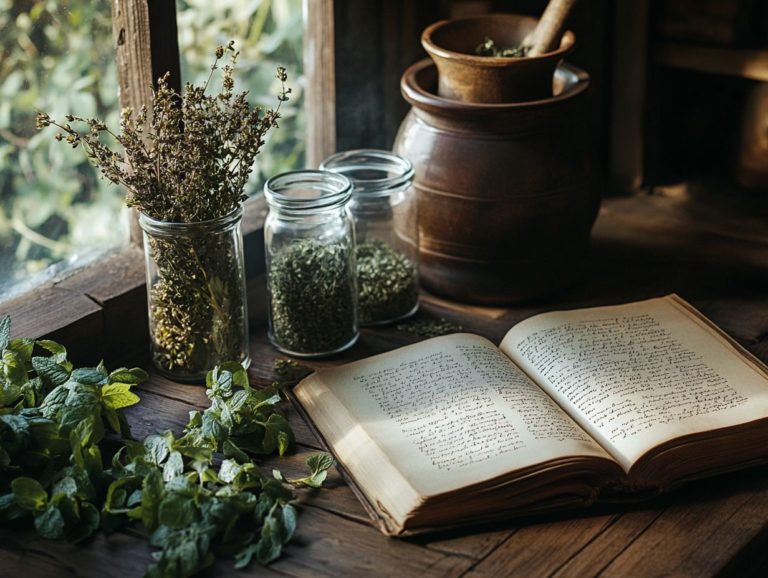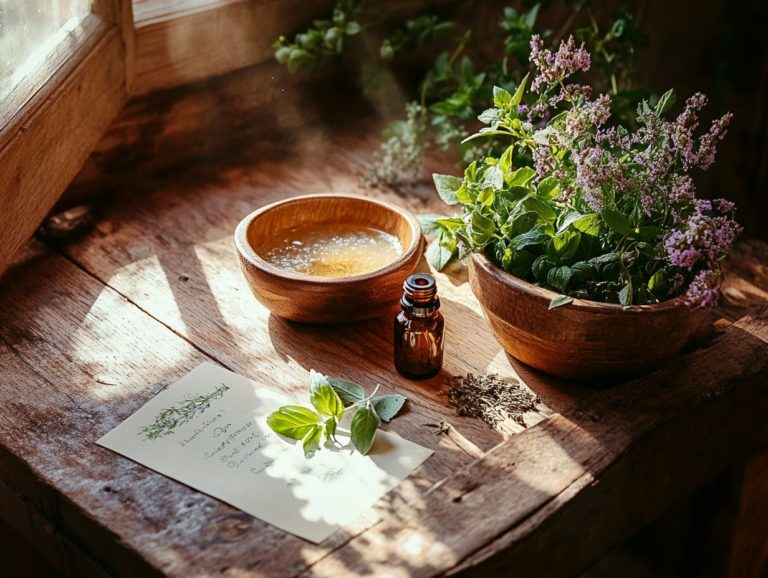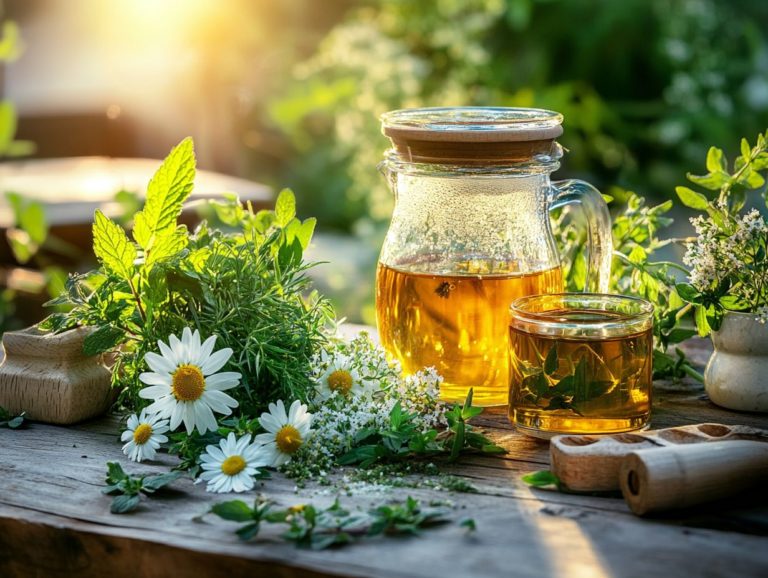5 Herbal Recipes for Relaxing Weekends
In today’s fast-paced world, carving out time for relaxation is more crucial than ever. This article delves into five delightful herbal recipes specifically designed to help you unwind and rejuvenate during your weekends.
From the soothing embrace of Lavender and Chamomile tea to the invigorating kick of Lemon and Ginger herbal tonic, each remedy offers a distinctive approach to enhancing your relaxation routine. You ll discover the benefits, potential risks, and effective ways to seamlessly incorporate these herbal solutions into your self-care practices.
Embrace the tranquility and uncover how these natural remedies can truly transform your downtime.
Contents
- Key Takeaways:
- 1. Lavender and Chamomile Tea
- 2. Peppermint and Lemon Balm Foot Soak
- 3. Rose and Jasmine Bath Salts
- 4. Lemon and Ginger Herbal Tonic
- 5. Lavender and Eucalyptus Aromatherapy Massage Oil
- Why Use Herbal Remedies for Relaxation?
- What Are the Benefits of Using Herbal Remedies for Relaxation?
- Are There Any Risks or Side Effects of Using Herbal Remedies for Relaxation?
- How Can One Incorporate Herbal Remedies into Their Relaxation Routine?
- What Are Some Other Popular Herbal Remedies for Relaxation?
- Can Herbal Remedies Be Used in Conjunction with Other Relaxation Techniques?
- Frequently Asked Questions
- Discover the Amazing Benefits of Herbal Recipes for Relaxing Weekends!
- What are some commonly used herbs in relaxing recipes?
- Can I make these herbal recipes at home?
- How do I use herbal recipes for relaxation?
- Are there any potential risks or side effects of using herbal recipes?
- How often should I use herbal recipes for relaxation?
Key Takeaways:
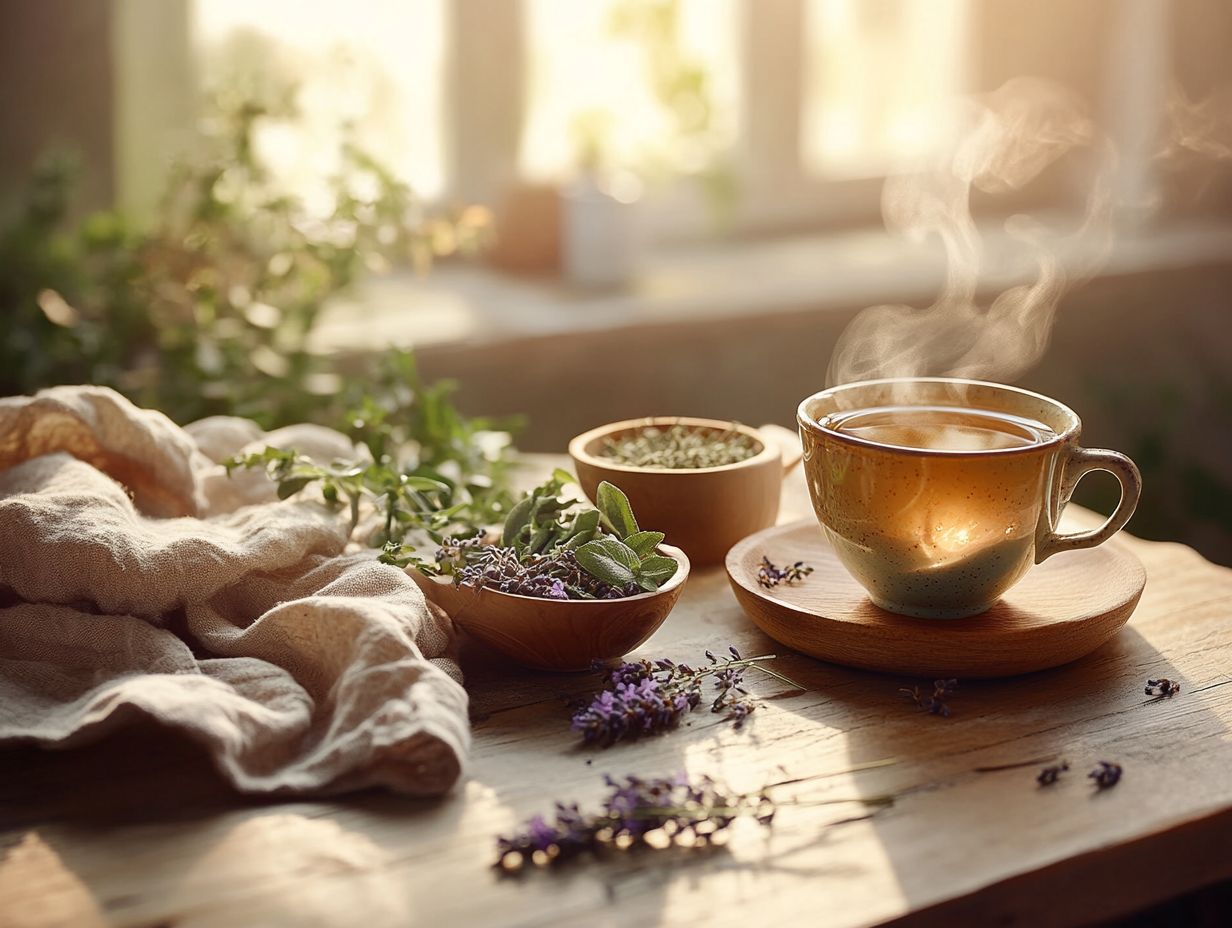
- Unwind with Lavender and Chamomile Tea it’s a calming classic!
- Give your feet a treat with a Peppermint and Lemon Balm Foot Soak, perfect for releasing tension and promoting relaxation.
- Indulge in a luxurious bath with Rose and Jasmine Bath Salts, ideal for soothing both the mind and body.
1. Lavender and Chamomile Tea
Lavender and chamomile tea are perfect for enhancing relaxation and improving sleep. They support your mental wellness and emotional health in today s busy world.
You ll create a calming ritual that melts away stress by incorporating these herbs into your evening routine. Brewing a delightful cup of lavender and chamomile tea is a breeze; simply steep a teaspoon of dried flowers in hot water for about five minutes.
Feel free to experiment with DIY recipes to elevate your tea experience try adding a touch of honey or a slice of lemon for an extra burst of flavor.
These herbs are packed with antioxidants that can uplift your mood and reduce anxiety, creating a tranquil atmosphere that invites relaxation as bedtime draws near.
2. Peppermint and Lemon Balm Foot Soak
A peppermint and lemon balm foot soak refreshes and balances your energy while helping you relax, providing a refreshing escape that revitalizes your energy levels.
Imagine immersing your tired feet in this aromatic blend, where you can experience immediate relief from the day s stresses. The cooling sensation of peppermint works in perfect harmony with the calming essence of lemon balm, soothing muscle tension and alleviating mental fatigue.
Creating this revitalizing soak is easy: simply steep fresh or dried leaves in hot water, allowing the steam to infuse the space with its uplifting aroma. This effortless wellness ritual fits seamlessly into your evening routine, promoting mindfulness and deep relaxation as you unwind after a long day. For an added boost, try delightful DIY herbal teas for wellness, which can rejuvenate your weary feet and nurture your mind, enhancing your overall well-being.
3. Rose and Jasmine Bath Salts
Rose and jasmine bath salts elevate your bathing ritual into a luxurious experience that promotes relaxation and nourishes your emotional health. It s a delightful way to unwind and shake off the stresses of the day.
These exquisite scents have long been celebrated for their calming effects. You ll find that rose offers a gentle embrace, soothing anxiety and fostering self-love, while jasmine uplifts your spirit and encourages a sense of tranquility. Traditionally revered in herbal remedies, both have been used to support emotional well-being and create a peaceful atmosphere.
If you’re looking to incorporate these calming elements into your routine, consider a simple DIY recipe: mix Epsom salt with dried rose petals and jasmine flowers, then add a few drops of essential oil. Just a handful of this aromatic blend in warm water can transform your bath into a sanctuary of relaxation. For an even more soothing experience, try one of the 5 herbal tea recipes for a relaxing evening, providing stress reduction and a moment of complete serenity.
4. Lemon and Ginger Herbal Tonic
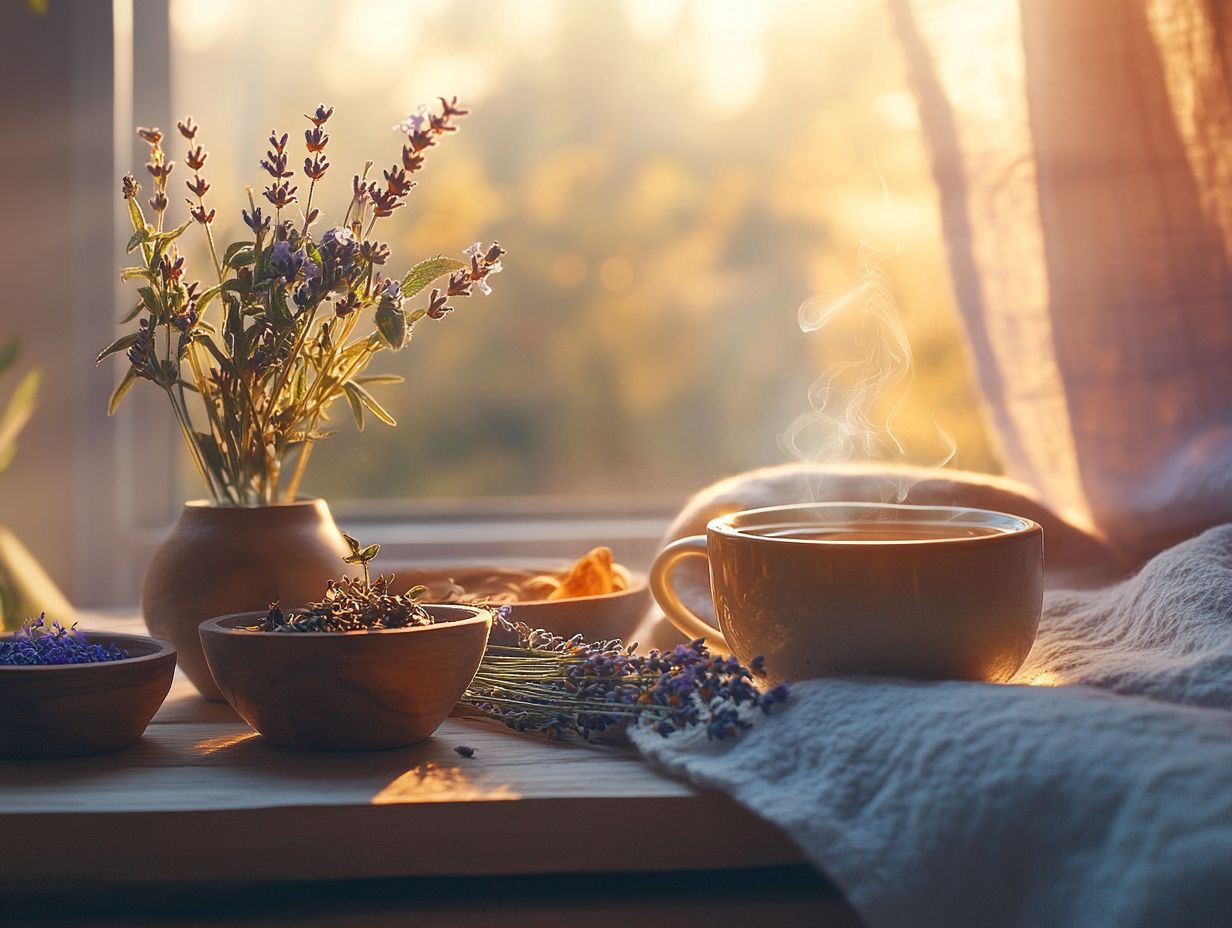
A lemon and ginger herbal tonic is more than just a refreshing drink. It s a powerful elixir that invigorates your senses while boosting energy levels and supporting wellness with natural ingredients.
Both lemon and ginger have been valued in natural health for centuries. Lemons are loaded with vitamin C, renowned for its immune-boosting prowess, while ginger shines with its anti-inflammatory benefits and digestive support. When you combine these two ingredients, you create an effective drink that can alleviate nausea and enhance gut health.
Preparing this tonic is a breeze: simply infuse fresh ginger slices and lemon juice in warm water, letting the flavors meld into a harmonious blend. By incorporating this invigorating drink into your daily wellness routine, you can elevate your hydration, promote detoxification, and lift your mood all while adding a delightful touch to your health-conscious lifestyle.
5. Lavender and Eucalyptus Aromatherapy Massage Oil
Lavender and eucalyptus aromatherapy massage oil delivers a soothing experience that fosters relaxation, seamlessly blending the calming essence of lavender with the invigorating notes of eucalyptus. This harmonious combination not only elevates emotional health but also significantly reduces stress. This unique blend not only alleviates tension but also invigorates the senses, making it a perfect choice for anyone seeking balance in their self-care routine.
To craft this luxurious oil, simply combine a few drops of high-quality lavender essential oil with eucalyptus essential oil, mixing them into a carrier oil like sweet almond or jojoba. The calming effects of lavender will aid your sleep and ease anxiety. Eucalyptus helps clear your mind and supports respiratory health, making this blend perfect for self-care.
Incorporating this massage oil into your self-care practices can profoundly enhance your overall well-being. Picture this: you set aside a quiet evening, light some soothing candles, and use gentle strokes to apply the oil, allowing both your body and mind to indulge in its therapeutic benefits.
Why Use Herbal Remedies for Relaxation?
Herbal remedies for relaxation are popular because they fit well into a natural lifestyle focused on mental wellness, effective stress reduction, and holistic health practices rooted in the traditional uses of medicinal plants.
These remedies are exciting because of their powerful healing properties, celebrated across cultures for centuries. Take chamomile, for instance; it’s famous for its calming effects, often helping you achieve a more restful sleep. Similarly, the soothing scent of lavender has been shown to reduce anxiety and enhance your overall emotional well-being.
Herbs like ashwagandha and valerian root are also gaining popularity for their ability to alleviate stress and cultivate a sense of tranquility. Beyond their plant-based benefits, these herbal options carry cultural significance, serving as essential components in traditional practices and rituals aimed at fostering balance and harmony.
Embrace herbal remedies now! They nurture your physical health and stabilize your emotions, leading to a happier life.
What Are the Benefits of Using Herbal Remedies for Relaxation?
The benefits of using herbal remedies for relaxation are impressive, offering you enhanced mental health and improved emotional well-being. These calming blends work wonders in mitigating stress and fostering a deep sense of tranquility.
Natural solutions like these can significantly improve your sleep quality, allowing you to wake up feeling refreshed and rejuvenated. For example, chamomile is well-known for its soothing properties and has a long history of promoting restful sleep. Meanwhile, lemon balm is celebrated for its ability to reduce anxiety levels and elevate mood.
Incorporating herbs such as ashwagandha can also support hormonal balance, contributing to an overall sense of calm. Regularly using these herbal remedies doesn’t just provide you with immediate relief; it also builds long-term emotional resilience and mental clarity. They become invaluable tools for anyone seeking a more balanced and fulfilling life.
Are There Any Risks or Side Effects of Using Herbal Remedies for Relaxation?
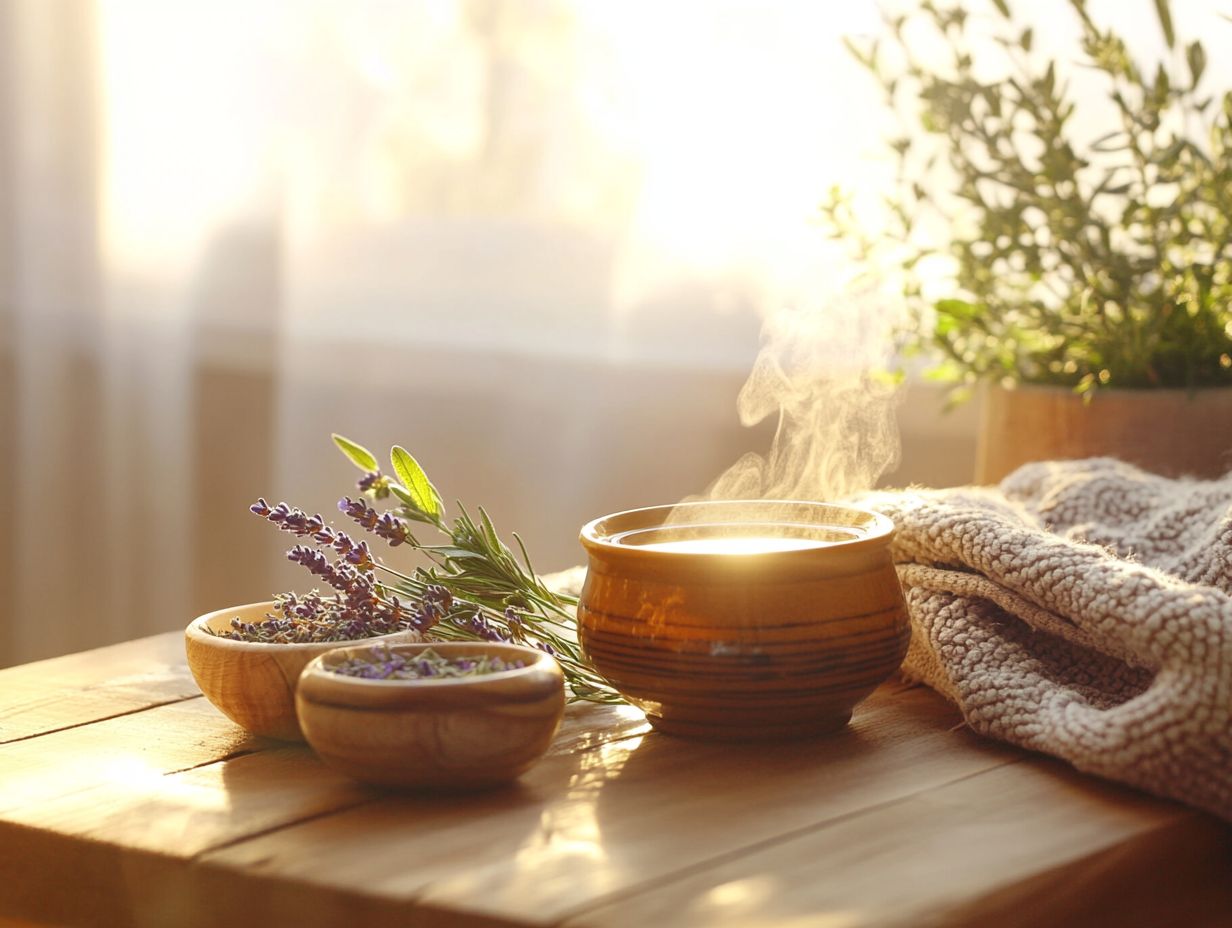
While herbal remedies for relaxation present a wealth of benefits, it’s crucial to be mindful of the potential risks and side effects tied to certain natural ingredients. This awareness is key to ensuring a safe and effective health journey.
Understanding herbal interactions and contraindications is vital, particularly if you have pre-existing conditions or are pregnant. These situations often place you at a higher risk for adverse effects, as the nuances of herbal supplementation can trigger unforeseen reactions when mixed with prescribed medications or other treatments.
Consulting with healthcare professionals can offer invaluable insights, providing tailored advice that aligns with your unique health profile. By taking these proactive steps, you can fully embrace the benefits of herbal remedies while minimizing risks, ultimately fostering a more balanced approach to your health and wellness.
How Can One Incorporate Herbal Remedies into Their Relaxation Routine?
Incorporating herbal remedies into your relaxation routine can be effortlessly achieved through simple self-care practices. Think calming blends, delightful herbal teas, and soothing DIY herbal recipes tailored just for you.
Take a few moments each day to explore these remedies, and you might just discover a newfound sense of tranquility. Preparation methods can vary: perhaps you brew a warm cup of chamomile tea before bedtime or create a calming herbal sachet infused with lavender to tuck under your pillow.
Timing also plays a pivotal role; integrating these routines during quiet moments like after a hectic day or first thing in the morning can truly amplify their effectiveness. By personalizing your rituals to suit your tastes and needs—mixing your favorite herbs or adjusting steeping times—you can unlock the ultimate path to relaxation and stress relief. For a wonderful experience, consider trying some herbal bath recipes for relaxation.
What Are Some Other Popular Herbal Remedies for Relaxation?
Besides lavender and chamomile, consider exploring other popular herbal remedies for relaxation, such as ashwagandha, holy basil, and passionflower. Each of these herbs boasts unique calming properties that can significantly enhance your emotional health and aid in stress reduction.
Ashwagandha, known for its adaptogenic properties, helps the body adapt to stress while promoting a sense of balance in your life. Holy basil, often a staple in traditional remedies, can support your mental clarity and help diminish feelings of tension. Meanwhile, passionflower is celebrated for its ability to enhance sleep quality and soothe any restlessness you might experience.
These herbs can easily be integrated into your routine in various forms, including:
- Soothing teas that provide immediate warmth and comfort
- Concentrated tinctures for quick absorption when you need it most
- Dietary supplements that offer convenient daily support
By incorporating these options into your wellness regimen, including 5 delicious herbal tea blends to try, you can cultivate a more serene environment, allowing you to navigate your day with greater ease and tranquility.
Can Herbal Remedies Be Used in Conjunction with Other Relaxation Techniques?
Herbal remedies are a powerful addition to your relaxation toolkit, creating a holistic health strategy that elevates your overall stress reduction and emotional well-being.
Integrate practices like meditation or yoga to find your inner calm, while deep breathing exercises further enhance your relaxation and mindfulness. When you combine these techniques with herbal supplements, think chamomile for its soothing effects or ginger for its calming properties. You can also explore crafting herbal tea blends for every mood to create a synergy that amplifies the benefits of both.
This approach alleviates tension and promotes balance and tranquility. It gives you the power to navigate daily stresses with greater ease and resilience, making each day a little more manageable.
Frequently Asked Questions
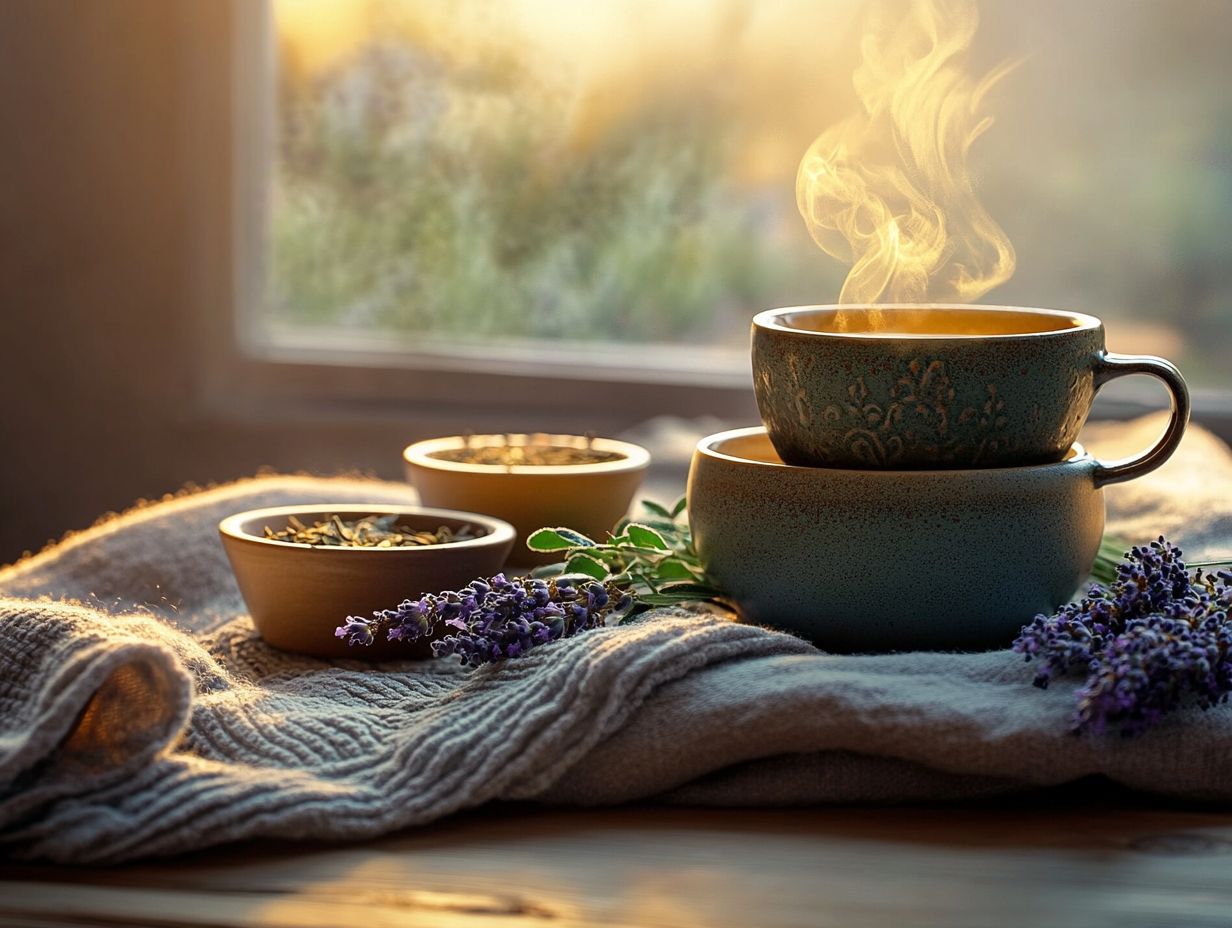
Here are some common questions about herbal remedies for relaxation.
Discover the Amazing Benefits of Herbal Recipes for Relaxing Weekends!
Unlock a natural way to unwind! These herbal delights help you relax without any side effects from medications.
Herbal recipes offer a natural way to relax. They avoid the potential side effects of medications.
These recipes can help reduce stress and promote better sleep.
What are some commonly used herbs in relaxing recipes?
Lavender, chamomile, lemon balm, passionflower, and valerian are popular herbs. These herbs have calming and sedative properties that promote relaxation and reduce stress.
Can I make these herbal recipes at home?
Yes! Most herbal recipes for relaxing weekends are easy to make at home. You can customize them for convenience, using fresh and organic herbs.
How do I use herbal recipes for relaxation?
There are many ways to use herbal recipes. You can make teas, soak in baths, or even use them as essential oils.
It’s important to follow the instructions carefully. Consult a healthcare practitioner if you have any allergies or medical conditions.
Are there any potential risks or side effects of using herbal recipes?
While herbal recipes are generally safe, use caution. Consult a healthcare practitioner if you are pregnant, breastfeeding, or taking medications.
Some herbs may interact with certain medications or have adverse effects in certain individuals.
How often should I use herbal recipes for relaxation?
Use them whenever you feel the need! A few times a week can lead to the best results.

